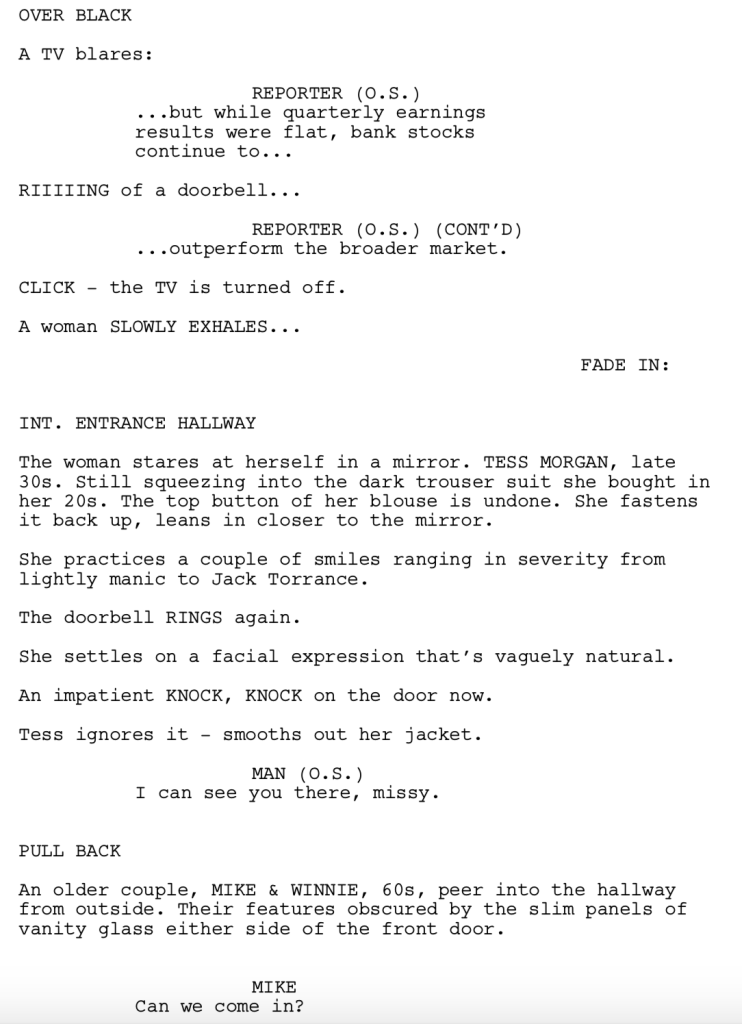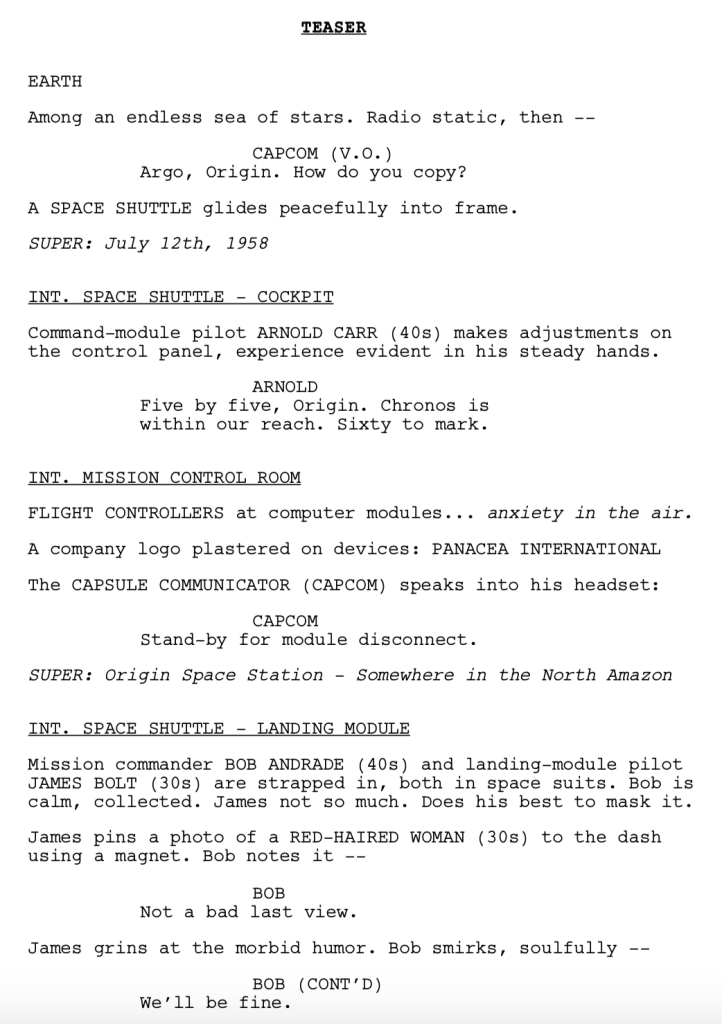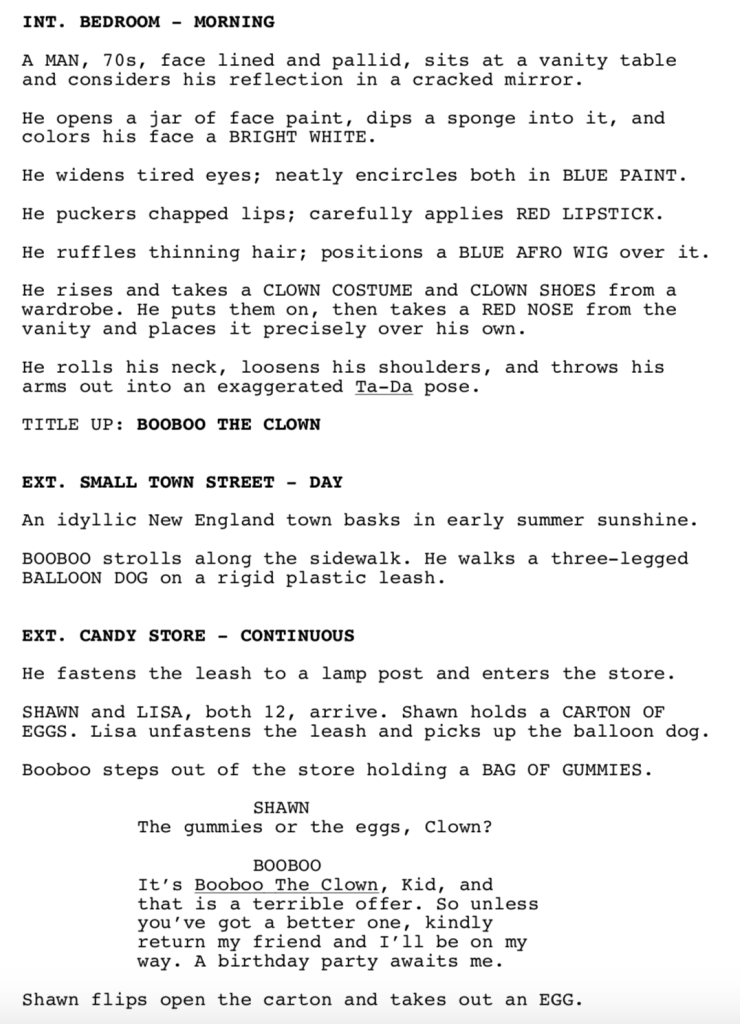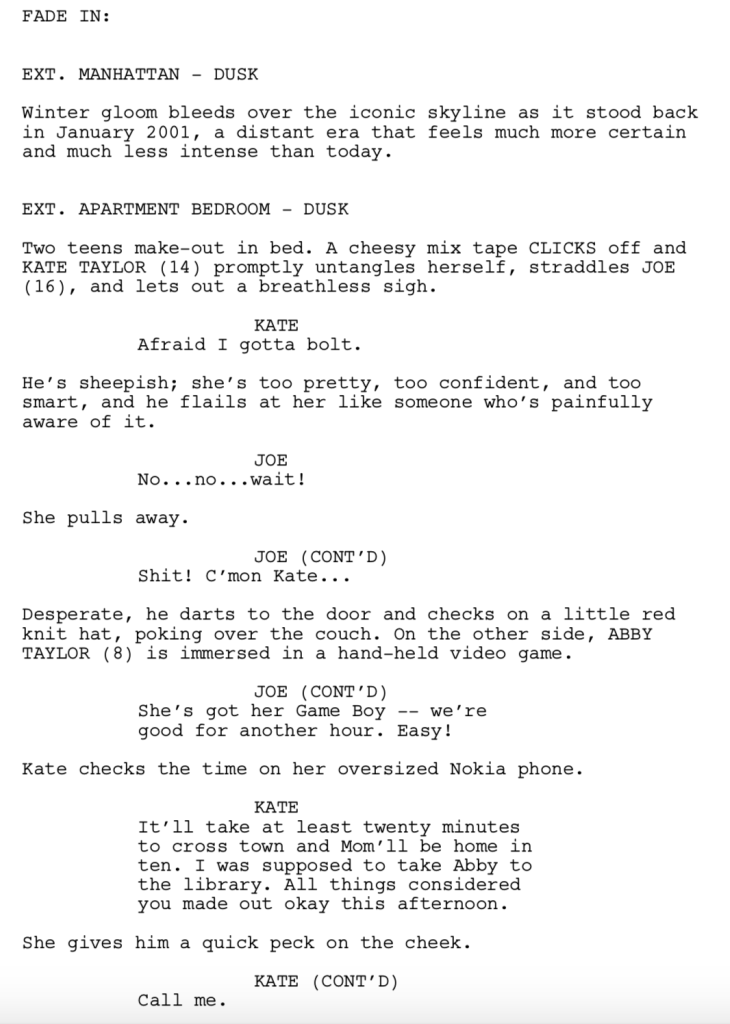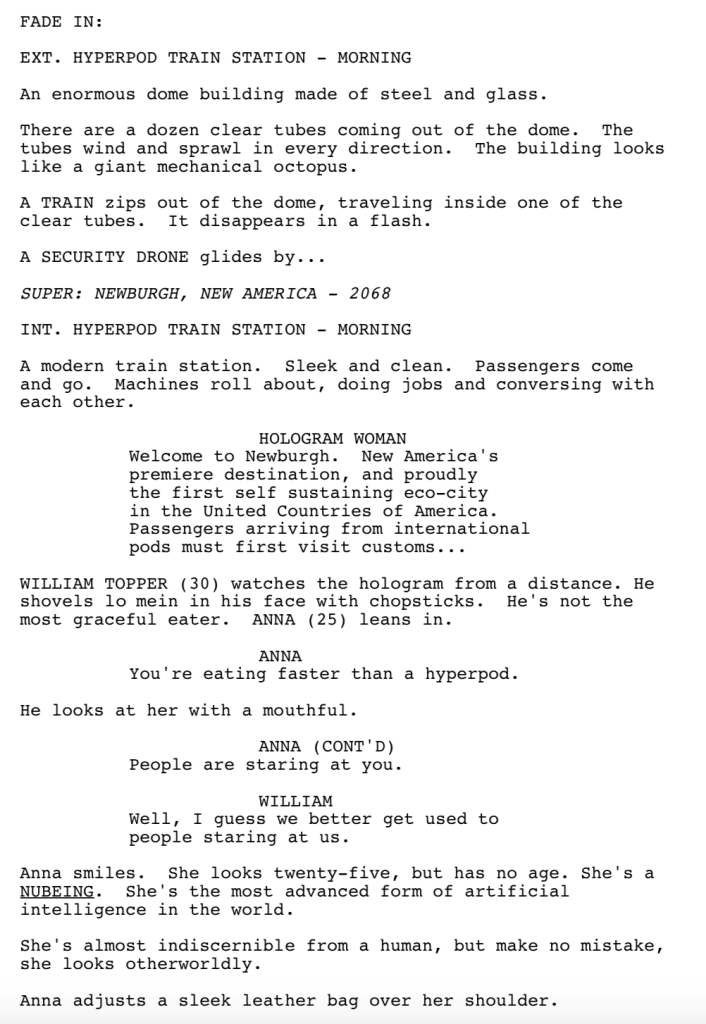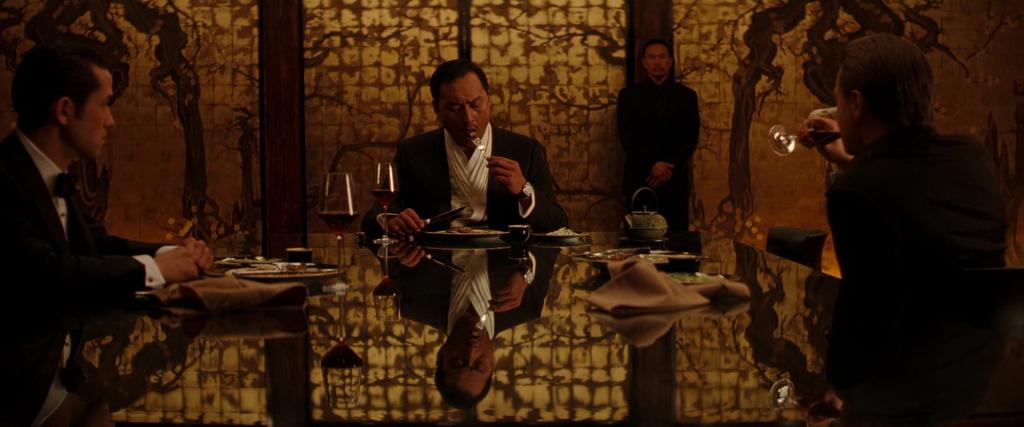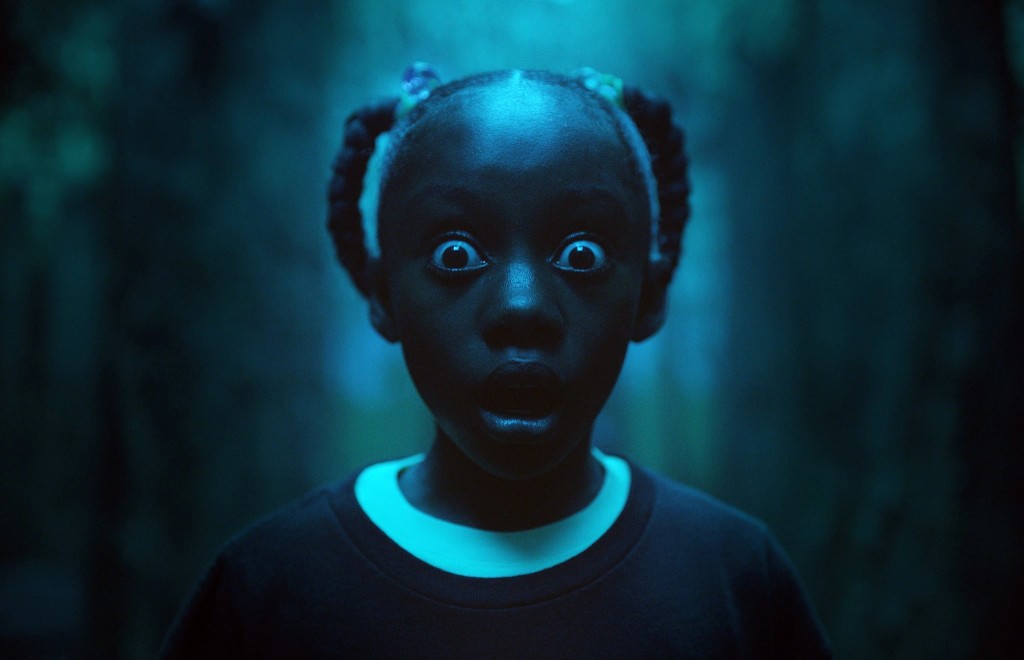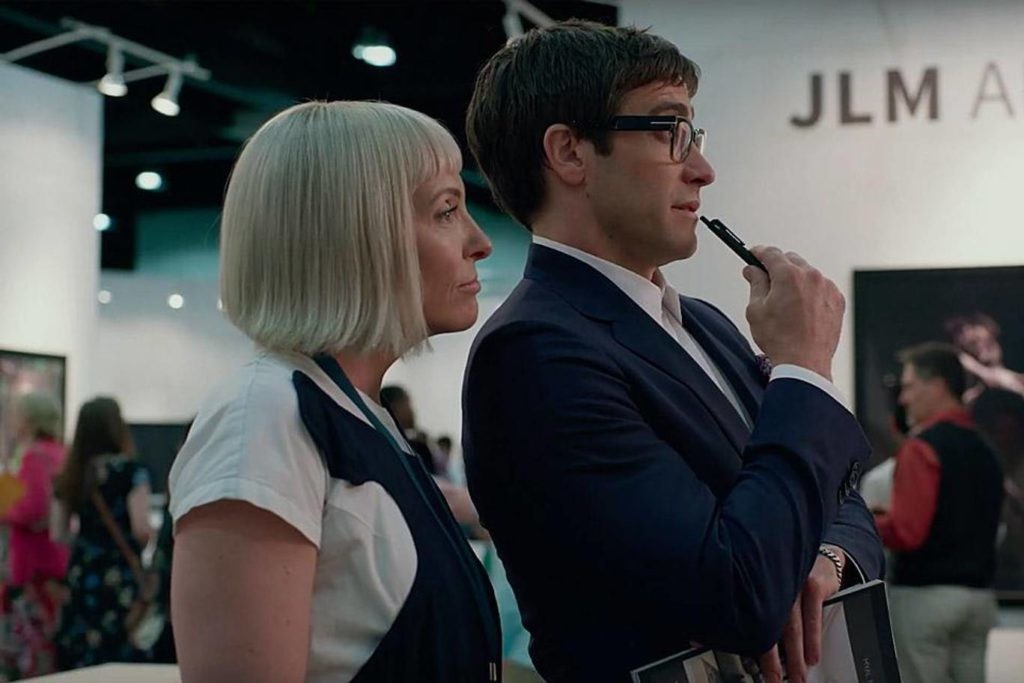Genre: Thriller/Supernatural
Premise: In the premiere episode of CBS All Access’s Twilight Zone, a bad comedian is given the opportunity to become famous. But that fame comes with a price.
About: When Hollywood showed up at Jordan Peele’s door with a blank check, the first thing he said he wanted to do was revitalize The Twilight Zone. So he teamed up with Simon Kinberg to bring the famous show into the modern age. Kinberg sold the show this way: “We would do what Rod’s instinct and impulse was, which was to break barriers, to tell new kinds of stories, to create something that was so outrageous and noisy and dangerous that it wouldn’t fit into sort of the standard way of storytelling.” Those are bold words. Is that what we got?
Writer: Alex Rubens
Details: 1 hour long
What’d you think we’d be talking about today?
It’s Jordan Peele’s world. We’re all just living in it.
Can Hollywood’s new golden child keep his winning streak alive? Find out with me.
Samir is a terrible comic. He’s convinced that comics need to have “something important to say about the world” for their act to be relevant. His main routine is about the second amendment, a heady dive into what each word in the amendment means. Needless to say, he doesn’t get many laughs.
Then one day Samir is visited by legendary comic JC Wheeler. JC tells Samir that he can be a great comedian. But he has to stop talking about politics and start talking about his life. When his next set tanks, Samir decides to use JC’s advice and tells the crowd about his kooky dog named “Cat.” Out of nowhere, everyone starts laughing.
Except when Samir gets home that night, his dog is gone. In fact, his girlfriend tells him they’ve never had a dog. What’s going on? The next day Samir does a set about his 10 year old nephew who wants to be a comedian when he grows up. Afterwards, his nephew’s been erased from existence.
Samir finally catches on. Whatever he talks about ends up being erased. So Samir begins using this power for evil. For example, he sees old friends on Facebook who he doesn’t like and talks about them on stage so that they disappear. Unfortunately, his success starts going to his head, and soon he’s blowing off his girlfriend and playing ‘cool guy at the bar.’
When Samir is given a chance at landing a big show, he needs only to beat out Didi Scott, his best friend at the club. Of course, why beat her out when he can just talk about her on stage and make her disappear? Will Samir stoop to that level? Or does he still have some semblance of morality in him?
I won’t call The Comedian an outright disaster. But it’s close.
Something feels off about the episode from the opening scene. It was the tone. It’s supposed to be this weighty examination of a comedian desperate for fame. Yet none of the characters were selling it. That’s when it hit me. Every single one of these characters is being played by a comedy actor. Which you would think makes sense in a script about a comedian. But this was a drama. Not a comedy. And the actors didn’t have the emotional depth to nail those dramatic beats.
It was around this time that I checked out who wrote this. Alex Rubens. The writer of such dramatic and thrilling films as Community, Keanu, Rick and Morty, Key and Peele. Not only were we missing actors who could handle the dramatic beats, we were missing a writer who could handle them as well.
Something tells me this was a movie idea of Jordan’s. But unlike Us and Get Out, he hadn’t fleshed it out. So he sent it over to his buddy Alex to turn it into a one hour episode on Twilight Zone. Somewhere in that exchange, Jordan forgot to explain what the episode was actually about. It starts out with a sliver of a good idea – Would you be willing to lose the people you love in order to become famous? But somewhere along the way it becomes about a guy who uses his power to make people he doesn’t like disappear.
The longer the episode went on, the more frustrated I got. This was the pilot episode for the rebirth of one of the most iconic shows ever. And you dump this garbage heap up to our door?
It might have been a lost cause from the start. Serious movies about comedians never turn out well. I think there’s two decent ones in all of history. Sure, there’s something ironic about examining the serious side of comedy. But you also take the best thing about comedy – laughing – and eliminate it from the equation. So now we’re just watching depression. Yippee.
That was another thing. I couldn’t tell if Samir’s comedy bits were supposed to be funny or if the audience was only laughing because JC had put a spell on Samir’s routines to make people laugh regardless of what he said. If we’re unsure whether your comedy bits are intentionally unfunny or not, your flick’s got a lot of problems.
The episode FINALLY finds a good thread when Samir, who suspects his girlfriend’s mentor, David, is trying to fuck her, brings it up in his next routine. Afterwards, David doesn’t exist. Except now, his girlfriend is no longer a lawyer. She’s a waitress. Why? Because her mentor, David, was never there to help her. Okay, I thought, now we’re on to something.
But in the very next scene, Samir’s girlfriend gets in a fight with him for no discernible reason. Why is she mad at him, I asked. She was just dying laughing watching his set. Ohhh, because it was time for an “argument scene.” Classic bad screenwriter mistake. Your characters don’t have a reason to argue. But you need them to argue for your next plot point to make sense so let the arguing begin!
Jordan Peele is the coolest nicest guy in the world. I saw him on Bobby Lee’s (a fellow comedian) podcast earlier in the year. The two go way back. When Peele started to blow up, he gave Bobby Lee a huge job that basically paid his mortgage for a year. And he does that sort of thing for a lot of people. But if Peele starts prioritizing helping his friends over creating good entertainment, he’s not going to be the belle of the ball for long. You still have to hire people who are capable of doing the job. The guy who wrote this episode is not capable of doing the job. Nor were half the actors cast in this episode. I hope Peele learns that lesson.
[ ] What the hell did I just watch?
[x] wasn’t for me
[ ] worth the stream
[ ] impressive
[ ] genius
What I learned: Although they found a way to screw it up, The Comedian is a good example of how to add a “tax.” A “tax” is something you add to your hero’s choices. The hero can choose to gain something (fame). But there’s a tax to that gain (something he loves ceases to exist). You should be taxing your characters with every choice they make.
In it, I share my thoughts on Apple’s confusing announcement for their new streaming service, Jordan Peele’s emergence as a screenwriting hero, give thumbs up and thumbs down to all those new trailers that debuted in the last month, and oh yeah, review a screenplay that I swore I would never ever review for as long as I lived. You’re going to want to check it out. If you haven’t received the newsletter, make sure to check your SPAM and PROMOTIONS folders in your e-mail program. If you can’t find it there, e-mail me at carsonreeves1@gmail.com with the subject line, “NEWSLETTER!” and I’ll send it to you. Enjoy!
It’s a slow weekend at the cinema which means I’ll have to watch something Netflix snuck onto its service while no one was looking (their preferred method of advertising). Who wants to start a website with me called “Media Aggregator” where we distill the 8 million TV and movie options down to a select few you should be watching? We’ll make billions. BILLIONS I SAY!
In the meantime, here are some screenplays to read.
Amateur Showdown is a mini-screenplay tournament where you read as much of each script as you can, then vote for your favorite in the comments section. Whoever receives the most votes gets a review next Friday. If you’d like to submit your own script to compete in a future Amateur Showdown, send a PDF of your script to carsonreeves3@gmail.com with the title, genre, logline, and why you think your script should get a shot.
Title: Bank, Die, Repeat
Genre: Time Loop Heist
Logline: A washed-up realtor gets caught in a time loop when she tries to rob a bank. Forced to relive the heist again and again, she’s soon convinced that whatever’s in the safe is more valuable than money, it’s the key to turning her life around.
Why You Should Read: This script started life as a three word phrase – ‘time loop heist’. It ended as a dark comedy I’d pitch as ‘Jerry Lundegaard stuck inside Danny Ocean’s Groundhog Day.’ Only Jerry is now a woman named Tess. — I’ve bludgeoned the protagonist with the despondency stick. Her love life, her family life, her working life – she’s losing control of it all. If you’re interested in how (or indeed, if) she can pull it all back together again and find redemption, then give the script a go. I’d appreciate your candid thoughts.
Title: Second Earth
Genre: TV Pilot – Science Fiction
Logline: Searching for a sense of purpose, an anxiety-ridden Earth orphan arrives on the prison moon Chronos as a new guard recruit… only to stumble upon a conspiracy for the near one million prisoners to stage a mass breakout and take the moon for themselves.
Why You Should Read: In the 1920s, Henry Ford established an industrial town deep in the jungle of Northern Brazil, hoping to make his own utopia called “Fordlandia”. Now imagine instead of a small town in Brazil… he did so with the moon. The series takes place in an alternate timeline where our moon, named Chronos, is habitable and is colonized by a billionaire philanthropist in the 1960s. Our story begins in 2082 as we see the moon now sustained by serving as basically a privatized prison for the United States and the colonies of Chronos wrought with civil tension between the descendants of the first Chronos colonies (called Natives) and Earthling immigrants. We will discover the story of the failure of this would-be utopia as we are embroiled in a conspiracy plot with a scale and character count rivaling that of Game of Thrones. Think A Tale of Two Cities in space.
Title: BOOBOO THE CLOWN
Genre: Family/Fantasy/Adventure
Logline: An eccentric old clown tries to cheer up a disabled boy by telling the story of his magical adventures on a lifelong quest to win the heart of a beautiful mime.
Why You Should Read: A massive THANK YOU to the commenters of Scriptshadow who read my first draft of this script and offered their valued thoughts and notes on it, and a special shout-out to Carson for his excellent notes and advice. All helped to propel this script to the next level. Booboo The Clown is an original, entertaining, and visually-appealing family-friendly movie. This one has it all. It has a larger than life lead character – a classic underdog – and a novel supporting cast with genuine arcs that actors will queue up to play. It has adventure. It has adversity. It has smiles, laughs and tears. It has scenes you have never seen before. And, most importantly, it has a fucking heart. I have poured my heart into this script and now I’d love to read your thoughts. I send it out as words amidst the wolves. Be ravenous.
Title: Fear Box
Genre: Horror
Logline: A traumatized single mother must protect her anxiety-ridden teen daughter when their darkest fears are brought to life by a haunted worry box.
Why You Should Read: It’s 2019 and it feels like anxiety is at an all time high! The goal was to write a fun horror script that deals with anxiety in a genuine way. The worry box is a real tool used to treat childhood and teen anxiety. I sent an early draft to the Bloodlist site for coverage and the feedback was positive. I’m hoping for some constructive criticism and the answer to the ultimate question before I spend tons more time working on this – is this concept/story something you would go see?
Title: D.I.R.E.
Genre: Science Fiction / Drama
Logline: Guess Who’s Coming to Dinner set 50 years in the future. A young man takes his Artificial Intelligence fiancé back to his small mountain hometown to meet his techno-phobic family.
Why You Should Read: I’ve been reading and following Scriptshadow for the last 7/8 years. Needless to say I’m a big fan of the site and all of you guys. I’ve just been lurking in the shadows (evil laugh). I live in Los Angeles, and have been a working writer for the last decade or so… but primarily in late night TV. I haven’t been able to crack the ever elusive feature world yet. This script is my first feature where all of my feedback has been super positive. And not the fake “I’m your friend” positive… as a writer you know the difference. Anyway. I’m extremely serious about the craft, and have put a ton of work into this one. If you like SciFi dramatic mysteries… this is for you… if you hate robots then beep boop beep boop… it’s probably not your cup of ET.
As we head into the weekend, before I put up Amateur Offerings, I wanted to give people a chance to share their feelings on the WGA’s battle with the agents. For those of you not up to speed, the WGA is planning to have all of their writers walk from their agents if the agents don’t get rid of packaging. I’m NOT the authority on packaging. But here’s how I understand it. When a writer comes up with a show idea, their agent will say, “Hey, as a favor to you, I’m going to allow you to keep my commission in return for you to allow me to package this project.” Packaging means attaching a director and talent (all within the agency – never from another agency – that’s a key distinction).
The thing is, when an agency packages something, they get a fee from the studio (the bigger the project, the bigger the fee, obviously) that often includes a percentage of the profits of that show. What this means is that agencies will now make more off a show than the person who actually created it. Nuts, right? Well, it gets uglier. If the writer has a project with say, Bradley Cooper attached, and Bradley Cooper is repped at another agency, they won’t bother putting the project together at all. Why? Because they don’t get their packaging fee. This means hundreds (thousands?) of potential shows have never seen the light of day because agents won’t touch a project that contains elements from another agency. This has created a culture where agencies no longer have any incentive to serve their clients’ interest. Their only goal is to package so they can get a piece of the pie.
Like I said, I’m not the authority here. And I may have gotten some of this wrong. If I did, please let me know and I’ll correct it. Also, the agencies argue that many of these projects only come together because they’re packaged. I don’t think there’s any way to prove that this is true or false, but I will say this. I’ve heard from several working writers who have moved from one of the Big 4 agencies to the agency tier just below them (and who don’t package), that they got a lot more work at the Big 4 agency. The consistent response was, “They’re scumbags but at least they’re scumbags that got things done.” If you want a more in-depth look at the issue, read The Wire creator’s feelings about packaging. It’s a good read, although a little confusing. It sounds to me like his problem was more about his literary agency and former TV agent ripping him off than it was about packaging. However, maybe someone can clear that up.
I’d love to hear arguments from both sides, especially agents, if you’re out there. I’m yet to hear a compelling argument about why packaging is okay. If there’s one out there, let’s hear it! Also, let’s try to keep this discourse civil. :)
I am FULLY AWARE that some of you are going to say to me, “ENOUGH, CARSON! ENOUGH WITH THE FIRST 10 PAGES! WE GET IT! THEY HAVE TO BE GOOD!”
Here’s the problem. They’re not good. The scripts I’m reading continue to have boring, bland, subpar, or outright bad first scenes. It occurs so often, I’m shocked when someone actually does write a good first scene. I’m mixing messages here. First 10 pages? First scene? What are we talking about, Carson? Let’s go with the first scene. It’s easier to build an article around that.
Now what I’m about to tell you is going to make you a hundred times better writer. Yes, I’m making that bold of a claim because that’s how powerful this piece of advice is. Are you ready? Here’s the tip: TELL A STORY WITH YOUR FIRST SCENE.
Do not open with an image. Do not open with a scene fragment. Do not start with a montage. Don’t set up your character. Don’t set up your plot. Whoa whoa whoa wait a minute, Carson. Don’t set up your character? Isn’t that one of the first things we’re told to do? Sure. Except setting up your character as opposed to telling a story is exactly why YOUR FIRST SCENE IS SO BAD. If you tell a good story with your first scene, your character will automatically be set up.
Now where were we?
Oh yeah.
The most powerful way to start your screenplay, and therefore the best chance you have of pulling a reader in, is to TELL A STORY. What does that mean? I’m glad you asked. Telling a story, in this context, is the act of writing a MINI-MOVIE to start your screenplay. That means you start with a first act (buildup and anticipation), move to the second act (character encounters conflict/obstacles), and kick’em in the gonads with your third act (resolution). Except because it’s the ending of your first scene and not an entire movie, your resolution will usually pose a question that makes people want to keep reading.
Confused?
Don’t worry. I’m going to give you five examples of writers who got this right. But before we get to that. A couple of things. I don’t care if you list examples of movies in the comments section that don’t do this. The reality is that movies which have a good story in their opening scene almost always turn out to be good movies as a whole. Also, note that many movies are forced to add opening credit scenes that weren’t in the original scripts. This is due to contractual union stuff that the filmmakers have no control over. It’s important to know this so that when you watch slow boring opening credits sequences in your favorite movies, you don’t misinterpret that to mean it’s okay to do so yourself. Let’s get started.
Inception – One of the most famous opening scenes of the past decade. A man arrives on a beach, walks into a castle, encounters another man who wonders if he’s here to kill him. Cut to a grimy bathroom with the beach man in a chair over a bath tub. Cut to a train where the man watching over the man in the bathroom is asleep and a young Asian man is watching over him. These three storylines intercut with one another as we realize some sort of mind heist is going on, which plays out to an elaborate conclusion. It can be argued that there are one too many mysteries being set up here. Regardless of that, Christopher Nolan is giving us a mini-movie for the first scene which is exactly what I’m asking you to do.
Us – Us has a much simpler first scene, but arguably a more effective one. I’m a huge advocate of simple storytelling so I love how Peele approaches this. A young girl is at a carnival. Her parents get distracted. She wanders off. She comes upon an empty Hall of Mirrors. She stumbles inside. She gets lost. She hears whistling. She follows it. Finally she’s confronted by something horrifying. Note that with this opening, all that’s happening is a girl wandering off. The scene plays out just as powerfully in its quiet moments (walking past a creepy homeless man) as it does its heightened ones (someone else is in the Hall of Mirrors with her). I bring this up to remind you that a story doesn’t need to have a million bells and whistles to work. As long as the story being told is compelling you’re good.
A Quiet Place – A Quiet Place’s first scene is its second best (after the birth scene). Like Us, we’re dealing with a very simplistic character goal. Travel into town and get supplies. However, we quickly realize there’s an added obstacle. They can’t make any noise. This heightens the tension of the scene considerably. They get what they need. The young son secretly pockets a noise-making toy. They walk back home. Just as they’re about to cross the bridge, the toy starts blaring, and the monster snatches him up.
The Matrix – A coincidence that one of the best sci-fi movies ever starts with a scene that tells a story? Two hackers, a man and a woman, are talking on a computer. The woman is warned that the cops have spotted her. The police show up to the building she’s in. This woman is wanted for something. But what? Here’s where things get fun. Three mysterious “agents” show up. They inform the police chief that the men they just sent up to get this woman are “already dead.” Huh? Cut to the police who try and kill the hacker woman, Trinity. She utilizes inhuman moves to kill them, then runs from the Agents, ending in a bizarre standoff where she charges towards a phone booth despite the fact that a truck is barreling towards and will crush it. They reach the booth at the same moment but she disappears before the truck can kill her! If this scene doesn’t inspire you to tell a story with your opening scene, I don’t know what will.
Promising Young Woman – Promising Young Woman is a screenplay that made the top of the Black List last year. I’m guessing its opening scene was a big reason why. We open on a bar with a bunch of stock trader types staring down a beautiful woman who’s hammered. Easy pickings. Except the nice guy of the group feels bad. Doesn’t want the girl to get hurt. Takes her back to his place. Hmm, maybe he’s not so nice after all. He’s got this hot wasted girl all alone in the privacy of his apartment. Gotta take advantage of that. Except, just as he makes his move, she sits up, loses the distant gaze, and is completely coherent. The girl is fine. She always was fine. She’s played him to prove a point – that like all men, he’s a predator.
I would be perfectly fine if, for the rest of your screenwriting days, you wrote your first scenes this way. “But Carson… each screenplay is different and you should adjust your approach accordingly.” No. You can make this work for EVERY SCREENPLAY and 99% of the time, it will be better than whatever other option you were considering. Telling a story both pulls us in AND proves you can write, the two things that matter most to a reader.
Just so you have some reference points, here are a few movies that don’t tell stories with their opening scenes. Velvet Buzzsaw. There’s no story here. It’s a man wandering through an art show. It’s clearly meant to establish character and subject matter. But in not adding a story to the proceedings, it comes off as neutered and uninteresting. As long as we’re on Netflix movies, Roma is another good example. Cuaron sets up this house via lots of boring imagery. But there’s no story tying it together. Is it a coincidence that Roma was considered to be the most boring movie of the year? You decide. Or A Wrinkle in Time. That movie starts with a girl dreaming about her dead father. Does it establish that the girl’s father is dead? Sure. Did it tell a story that kept us engaged while doing so? Nope. Fail.
I want to finish up by saying one more thing. ALWAYS FAVOR THE STORY OVER THE SETUP. You’re going to want to set things up. Set up characters. Set up your world. Set up some plot. Of course you’ll need to do this. But these things should all be secondary to creating an entertaining story with your scene. If you focus too much on the setting up part, the story part will fade into the background and we’ll lose interest. A good example of this is the opening to Solo: A Star Wars Story. We meet Han Solo driving back from somewhere. He’s stolen something important (gotta set that up!). Then we gotta set up this orphanage he lives in. Then we gotta set up Q’ira. Than we gotta set up that him and Q’ira are together. Then we gotta set up what their plan of escape is. There’s so much setup that even though they’re telling a story in the scene, it gets lost amongst all the setup! If you want to win over the reader, give us a great story in that opening scene first… and set up your script second. You’ll thank me when Sony buys your script and says they were hooked from the very first page.
Now go get’em!
I’ve decided to extend my Nicholl Script Consultation discount for one more week! That’s $100 off 4 pages of notes. If you send me your script by Sunday, I can get you your notes back by April 7, which gives you three full weeks before the deadline. E-mail me (carsonreeves1@gmail.com) with the subject line: “NICHOLL.” Also, ask about my new deluxe logline consolation package, where we e-mail back and forth until we get your logline just right. E-mail me with the subject line: “LOGLINE!”




